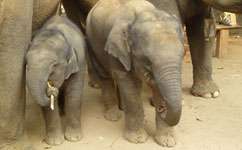Climate change endangers elephants, study says

By making new use of historical records, scientists have shown that climate change could have a greater impact on Myanmar's elephants' dwindling numbers than previously thought.
Hannah Mumby from the University of Sheffield, who led the study, found that the already endangered species faces further struggle as even the slightest temperature change can lower their chances of survival dramatically.
Climate change leaves the animals at risk of drought, disease and death as the heat causes freshwater supplies to dwindle, infectious diseases to spread faster and brings with it one of the biggest killers of elephants in Myanmar - heat stroke.
The study found that elephants thrive at an optimum temperature of 23oC, and deviations from this leave them more vulnerable. The Myanmar region is predicted to experience a rise of 0.1 to 3oC, over the next 30 to 40 years – a seemingly small change, but one that could wipe out the entire elephant population.
'We think of elephants as very resilient animals, very robust, but then we see at the same time there is a very narrow range at which they are at their optimal survival. If the climate changes by even a few degrees it can substantially reduce survival,' says Mumby.
She continues: 'We found that the youngest elephants, the calves, are quite susceptible to extremes. Once we move out of their optimal to their maximum temperature, it doubles their mortality risk .'
The discovery that calves are particularly threatened by rising temperatures is important, since these offspring are integral for the survival of the species. Elephants, like humans, reproduce later in life and if the calves die before they can mate then the species will be unable to survive.
The variations in temperature between seasons in Myanmar are already large, but the climate projections show that not only will temperatures rise but there will be fewer monsoon months. The higher the rainfall, the better the chance of survival is for the elephants; dryer hotter months could prove to be fatal.
There has been little previous research into how long-lived species will adapt to climate change, since the time required to study generations of these animals exceeds the lifespan of most scientists. Mumby was given access to a unique database which held information on the lives of around 800 Asian elephants from 1960 to 2000. 'We have captured the whole lives of generations, their month to month survival, as well as the month to month climate, so we can look at small scale individual changes in a way we'd never be able to if we began collecting data now.'
Elephant life spans are similar to humans, but that is not the only similarity. Studying how climate change can affect elephant behaviour could provide an insight into how humans will react under changing environmental conditions. Mumby states that 'any similarities or differences are enlightening for understanding both species and their responses, particularly since both are long-lived animals that have survived events that caused the extinction of several other species, such as the last ice age.'
More information: Mumby, H., et al. In press. Climatic variation and age-specific survival in Asian elephants from Myanmar. Ecology dx.doi.org/10.1890/12-0834.1
Journal information: Ecology
Provided by PlanetEarth Online
This story is republished courtesy of Planet Earth online, a free, companion website to the award-winning magazine Planet Earth published and funded by the Natural Environment Research Council (NERC).














